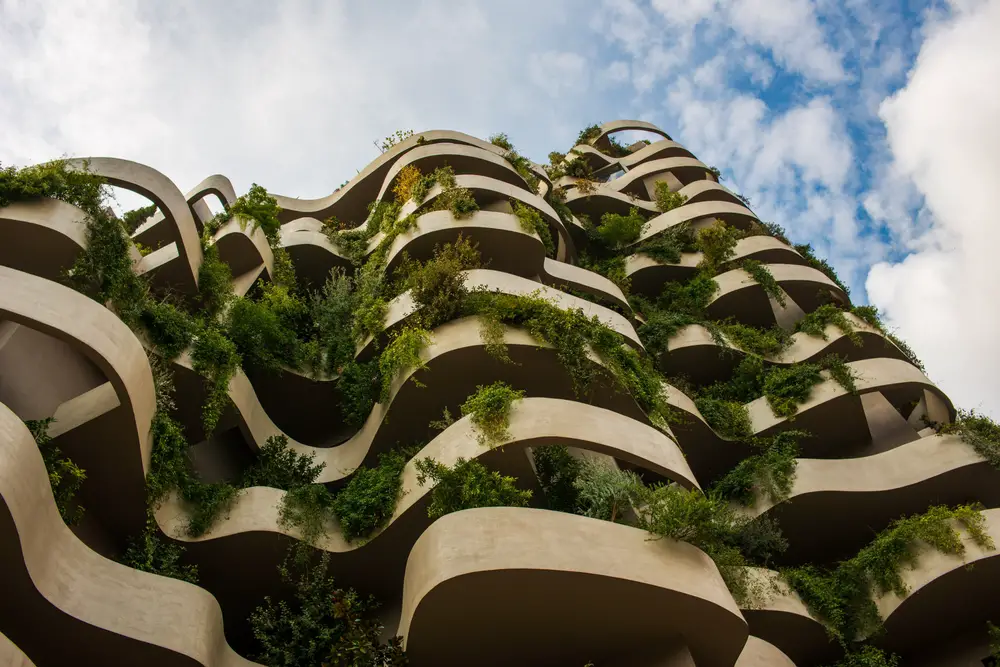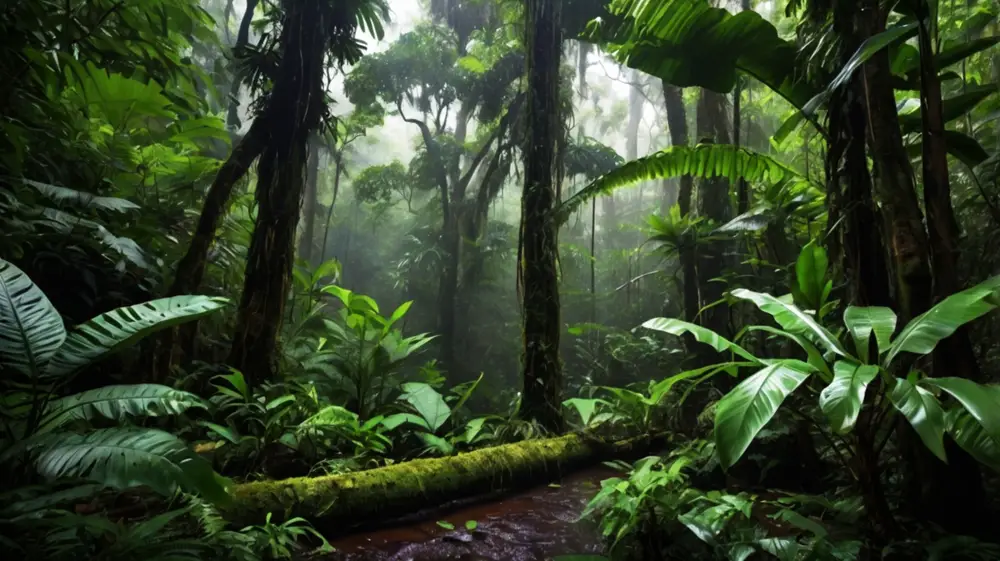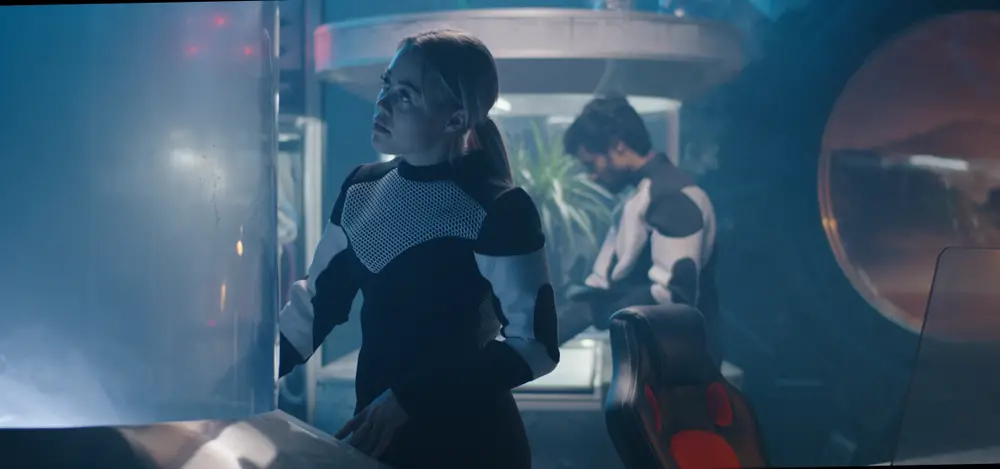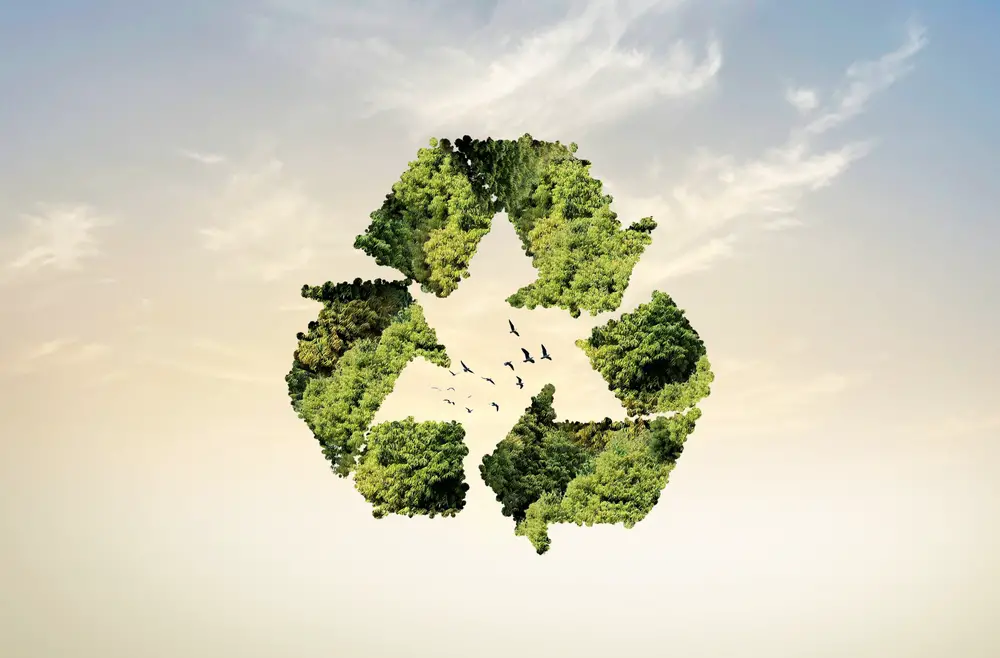In a world where fashion meets mindfulness, and your wellness journey intertwines with forward-thinking futurism, it’s time to turn our gaze to some wild predictions shaping our planet’s destiny. From eco-friendly innovations to mind-bending tech marvels, the next few decades promise to be nothing short of transformative. Imagine a future where you’re not just living on Earth but thriving in a utopia that sometimes feels like it’s been plucked from the pages of a sci-fi novel. These predictions aren’t just dreams but glimmers of reality, concocted by some of the planet’s most visionary thinkers. Strap in as we explore these dazzling possibilities that might just redefine what it means to live on Earth.
1. Urban Jungles Will Be the New Cities

Have you ever imagined living in a city where concrete dreams are replaced by lush greenery? Future urban landscapes might just become sprawling jungles, with skyscrapers draped in verdant tapestries of plant life. According to a report by the World Economic Forum, architects are already designing vertical forests that not only look stunning but also improve air quality and biodiversity. Picture yourself sipping your morning coffee while gazing out over a canopy of trees instead of a sea of asphalt. It’s a vision where the cityscape is not just a place to live but an ecosystem that breathes with you.
This enchanted reality could redefine urban living, as cities become more self-sustaining and nature-integrated. Green rooftops and vertical gardens would not just serve as eye candy but also as vital components of urban ecosystems. They could help mitigate temperature extremes, reduce flood risks, and encourage local food production. As natural and urban spaces blur, your daily stroll might take you through pathways lined with flowers and home-grown fruits. This isn’t just a fantasy; it’s a future that could be right around the corner.
2. Oceans Get a Makeover with Floating Cities

Imagine waking up to a sunrise that dances across the water, right outside your window. Floating cities could very well be the future of oceanic living, offering a sustainable solution to rising sea levels. These marine marvels might house thousands, with farms and forests atop rafts that bob gently with the waves. They could be a haven for biodiversity, offering habitats for marine life while providing humans with a unique, water-bound lifestyle. Living on the ocean doesn’t just sound romantic; it could become a necessary adaptation in the face of climate change.
Floating cities would likely be self-sufficient hubs, harnessing wave and solar energy to power their daily needs. You’d find markets filled with freshly caught seafood, harvested from aquaculture setups right beneath your feet. This new wave of living could foster innovation in architecture and city planning, drawing from indigenous knowledge and modern technology. While some might miss the grounding solidity of land, others could find solace in this floating freedom. After all, humans have thrived on water for centuries; perhaps it’s time to return to our roots.
3. Climate Personalization Will Be Available In Your Home

What if your living room could have its own microclimate, tailored to your personal preferences? Advances in climate control technology could soon allow you to create customized weather conditions within your own home. A study published by Nature Climate Change suggests that smart home technologies will increasingly incorporate AI-driven climate systems that optimize energy use while maximizing comfort. Imagine adjusting the humidity, temperature, and even scent to match your mood—whether you want a cozy, warm nook in winter or a breezy, cool escape in summer. It’s a personal oasis, crafted just for you by technology.
These personalized climate systems could also have significant benefits for your wellness and productivity. By adjusting light levels to match natural circadian rhythms, they might help improve sleep patterns and mental clarity. Beyond comfort, they could offer eco-friendly solutions by reducing the need for energy-intensive heating and cooling systems. As you move through your day, your home could seamlessly transition from bright and energizing to calm and soothing. It’s about making your space work for you, in harmony with the world outside.
4. Biodiversity Could Re-Wild the Planet

Picture a world where nature thrives like never before, with species diversity bouncing back to vibrant levels. Rewilding efforts could transform landscapes, bringing back the megafauna and dense forests once thought lost to history. You could find yourself living near habitats that host wolves, bison, and other keystone species, as nature’s balance is restored. This isn’t about turning back time but rather accelerating the healing of our planet. Through deliberate conservation efforts, rewilding aims to rebuild ecosystems that are rich, resilient, and self-sustaining.
Imagine the ripple effects on your life—cleaner air, more fertile soil, and a spectrum of wildlife encounters in your own backyard. You might witness birds on the mend, forests rejuvenating, and rivers teeming with life once more. The economic benefits could be plentiful, too, with ecotourism becoming a more significant part of local economies. It’s about creating spaces where humans and nature coexist in harmony, fostering a respect for the natural world that’s both mindful and progressive. By rewilding, we’re not just saving species; we’re crafting a sustainable future.
5. Space Travel Will Become the Norm

Remember when space travel was just for astronauts and sci-fi characters? Fast forward a few decades, and you might be booking your vacation to the Moon or Mars. According to SpaceX’s ambitious plans, outlined in a CNN article, space tourism is on the brink of becoming an accessible reality for the masses. Imagine stepping onto a spacecraft and leaving Earth behind, if only for a brief, awe-inspiring trip. Space travel could be the ultimate adventure, offering unparalleled views and experiences that redefine your place in the universe.
Beyond the thrill of exploration, space travel could open new doors for innovation and sustainability on Earth. It might lead to breakthroughs in technology and resource management as we learn to live and thrive in extraterrestrial environments. The quest for off-world living could inspire new ways to combat challenges on Earth, from food scarcity to energy consumption. As humanity reaches for the stars, these adventures could foster a global perspective, reminding us of the delicate beauty of our home planet. Space, once the final frontier, might become your new playground.
6. Conscious Consumers Will Dictate Product Creation

Imagine a world where every purchase you make is a vote for a better, more sustainable future. The conscious consumer movement could become the standard, with people prioritizing ethical and eco-friendly products. From fashion to food, brands might compete not just on quality but on their commitment to the planet. You’d find yourself surrounded by products that align with your values, each purchase contributing to a healthier Earth. It’s shopping as a form of activism, where your choices have a tangible impact.
As a conscious consumer, you could drive industries to adopt greener practices, reducing waste and carbon footprints. Packaging could become biodegradable, supply chains transparent, and production methods sustainable. It’s about creating an economy that respects both people and the planet, fostering a cycle of positive change. This movement might inspire you to rethink your habits, encouraging simpler, more intentional living. In this future, your wallet is a powerful tool for transformation.
7. AI-Enhanced Health and Wellness Will Keep Us Alive

Imagine having an AI assistant that not only reminds you to drink water but also predicts health issues before they arise. The integration of AI in health and wellness could revolutionize personal care, making it more proactive and personalized. A report from the Mayo Clinic highlights how AI-driven diagnostics are already making waves in predictive healthcare. This technology might monitor your vitals, suggest tailored workouts, and recommend dietary adjustments based on real-time data. It’s like having a personal health coach that learns and evolves with you.
The potential for AI in wellness extends beyond mere convenience; it could democratize access to quality healthcare. Think of remote diagnostics and virtual consultations that bring expert advice to your fingertips, no matter where you are. This transformation could reduce healthcare costs while improving outcomes, making wellness a seamless part of daily life. As AI becomes more intuitive, it could help foster a deeper understanding of your body’s needs. It’s about embracing technology to live not just longer, but better.
8. Renewable Energy Will Become The Star

Imagine a world where your home and city are powered entirely by renewable sources, leaving fossil fuels behind. The renewable energy renaissance could herald a cleaner, more sustainable era, driven by solar, wind, and hydro innovations. From solar panels on every rooftop to wind turbines dotting the landscape, this shift could redefine our relationship with energy. It’s not just about reducing carbon footprints but creating a resilient energy grid that adapts to the changing needs of society. In this future, energy is abundant, clean, and available to all.
This transition could have profound effects on daily life, from the way we travel to how industries operate. Electric vehicles might become the norm, and public transportation could be powered by cutting-edge technologies that reduce emissions. As cities become more energy-efficient, you could enjoy cleaner air and lower utility bills. It’s a future where sustainability and innovation go hand in hand, fostering an environment where people and the planet thrive. The renewable energy renaissance isn’t just possible; it’s essential.
9. Human Augmentation Will Make Us Actual Superheroes

Imagine a future where you can enhance your physical or cognitive abilities with the help of technology. Human augmentation could become a reality, blending biology and technology to push the boundaries of what’s possible. From exoskeletons that give you superhuman strength to neural implants that enhance memory and learning, the possibilities are staggering. This isn’t just about achieving extraordinary feats but about improving quality of life for all. It’s a new era of human potential, where limitations are not barriers but opportunities for innovation.
As augmentation technologies advance, they could revolutionize industries, healthcare, and even social dynamics. People with disabilities might find new ways to engage with the world, while aging populations could enjoy healthier, more active lives. Ethical considerations will play a crucial role in shaping this future, ensuring that enhancements are accessible and equitable. This isn’t about creating a world of superhumans but fostering a society where everyone can reach their full potential. The future of human augmentation is about harnessing technology to elevate humanity.
10. Virtual Worlds Will Be Full of People

Imagine stepping into a digital realm where you can experience any world you desire, without ever leaving your home. Virtual reality (VR) and augmented reality (AR) could transform entertainment, work, and social interactions, creating new avenues for creativity and connection. From virtual concerts to digital tourism, these technologies might allow you to explore and engage with experiences that are both immersive and interactive. It’s not about escaping reality but enhancing it, offering new perspectives and opportunities for growth.
In this digital future, workspaces could become more flexible and inclusive, allowing people to collaborate from anywhere in the world. You might attend meetings as a hologram or explore digital environments that foster creativity and innovation. This shift could redefine education, offering students immersive learning experiences that transcend traditional methods. As virtual worlds become more integrated into daily life, they could offer new ways to connect, learn, and grow. It’s a future where the lines between the physical and digital blur, offering endless possibilities.
11. Products Will Be Designed To Be Reused

Imagine a world where waste is a thing of the past, replaced by a circular economy that champions sustainability and innovation. In this future, products are designed to be reused, repaired, and recycled, minimizing environmental impact. You could find yourself part of a system where resources are continuously cycled, reducing the need for raw materials and decreasing waste. It’s not just an economic model but a mindset, fostering creativity and responsibility in production and consumption.
This transformation could impact every aspect of life, from how products are made to how you shop and dispose of items. Companies might adopt new business models focused on product longevity and resource efficiency, encouraging sustainable consumption. This shift could lead to job creation in green industries, as well as reduced carbon emissions and environmental pollution. By embracing a circular economy, society could foster a culture of sustainability that benefits both people and the planet. It’s about redesigning the systems that shape our world for a better future.
12. Genetic Technology Will Cure Disease

Imagine a future where genetic advancements allow you to cure diseases, enhance health, or even design certain traits. The genetic revolution could unlock new possibilities, from personalized medicine to bioengineered solutions for global challenges. Through CRISPR and other gene-editing technologies, you might find treatments for conditions once thought incurable. This isn’t about playing god but harnessing science to improve lives and tackle pressing issues.
As genetic technologies advance, they could revolutionize healthcare, agriculture, and environmental management. You might see crops engineered to withstand climate change or new therapies that tailor treatments to your genetic makeup. These innovations could spur ethical debates, as society navigates the balance between potential benefits and moral considerations. By exploring the frontiers of genetics, humanity could unlock solutions to some of the world’s most pressing challenges. It’s a future where science and ethics go hand in hand to shape a better world.
13. Quantum Computing Plunge Us Into A Sci-Fi Future

Imagine a world where computing power is so advanced that it can solve complex problems instantaneously. Quantum computing could revolutionize industries, from pharmaceuticals to finance, unlocking new levels of innovation and efficiency. These computers, leveraging the principles of quantum mechanics, might process information at unprecedented speeds. It’s not about replacing traditional computers but augmenting them, enabling breakthroughs that were once out of reach.
In this quantum future, industries might see rapid advancements in fields like materials science, cryptography, and artificial intelligence. You could benefit from more efficient drug discoveries, secure communications, and optimized supply chains. This leap in computing power could drive economic growth and foster a new wave of technological innovation. As quantum computing unfolds, it could reshape our understanding of what’s possible, offering tools to address global challenges. It’s a future where the boundaries of technology and imagination converge.
